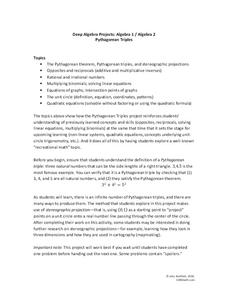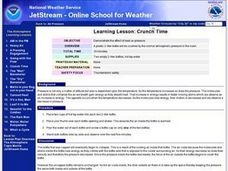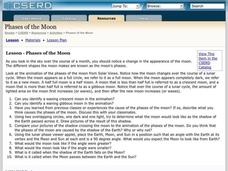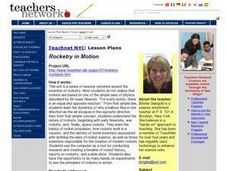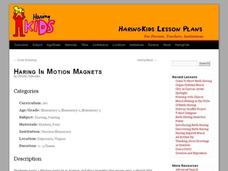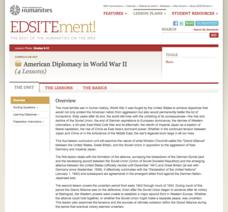Curated OER
Electric Charge
Students discover and identify positive and negative electrical charges and understand that like repels and opposite charges attract. In this physics lesson, students observe how friction can be used to give electrical charge to various...
Curated OER
Magnetism
Second graders conduct a variety of inquiry based learning activities. In this magnetism instructional activity, 2nd graders explore magnets with a partner, they learn the terms attract and repel, examine the poles of a magnet, and...
5280 Math
Pythagorean Triples
From Pythagorean triples to the unit circle. Learners use the Pythagorean Theorem to find Pythagorean triples and then relate their work to the unit circle in a fun algebra project. Their discovery that x^2+y^2 is always equal to one on...
EngageNY
Sequencing Translations
Investigate the results of multiple translations on an image. Scholars use vectors to perform a sequence of translations in the seventh lesson plan of 18. They examine the results and determine the importance of using a sequence rather...
EngageNY
Solve for Unknown Angles—Angles in a Triangle
Assist your class with each angle of geometry as they use exterior angles to form linear pairs with adjacent interior angles. They cover multiple vocabulary terms and work practice problems, complete with justifications, before taking an...
EngageNY
Angles Associated with Parallel Lines
Explore angle relationships created by parallel lines and transversals. The 13th lesson of 18 prompts scholars use transparency paper to discover angle relationships related to transversals. Learners find out that these angles pairs are...
Curated OER
Learning Lesson: Crunch Time
Students demonstrate the effect of heat on pressure. They use a 2-liter bottle and hot tap water to complete the experiments. They also discuss thunderstorm safety rules.
Curated OER
Antonyms
Learners encounter words that are antonym pairs with opposite meaning. Students show examples of antonyms to the class. Learners increase knowledge of antonym pairs. Students share stories full of antonyms with each other.
Curated OER
Mechanism of Vision
Young scholars explore the eye and its vision. For this science lesson plan, students learn the way light reflected from objects enters the eye, the basic anatomy and physiology of the eye, and the basic mechanism of perception.
Curated OER
How Much Has Math Changed?
Students solve problems using the opposite, reciprocal and powers. In this algebra lesson, students solve problems with inequalities and absolute values. They show understanding of the basic content of math in this lesson.
Curated OER
Phases of the Moon
Young scholars create a model of the phases of the Moon by giving students pictures of the phases of the Moon, a picture of the Earth, and a picture of the Sun. They then take a picture, and stand in correct place to make the phases of...
Curated OER
Make a Lever
Pupils investigate how to make a lever. In this construction lesson plan, students explore how to construct a lever using dog and tail templates, cardboard, and fasteners. Pupils construct their simple machine in order to learn about...
Curated OER
Discovery Science Center Activities
Fourth graders complete a variety of experiments to meet science goals. In this life sciences lesson, 4th graders make yogurt, discover the attraction of opposite charges in electricity, learn the effects of glaciers, and explore...
Curated OER
Rocketry in Motion
Students investigate why a balloon flies in one direction as air escapes in the opposite direction, which helps them understand the nature of rockets and fireworks. Individually and in teams, students conduct research to create a...
Curated OER
The Analemma
Young scholars describe the relationship between the tilt of Earth's axis and its yearly orbit around the sun, by learning about analemmas. They determine what they can do to show that the sun's position doesn't change, and they find...
Curated OER
Fault Features
Young scholars discuss the different kinds of faults in the earth's crust and examine photos of the San Adreas Fault. Working in groups, they experiment with fault making by placing fabric in a pan and filling the inside with wet dirt....
Curated OER
Know Bones About It!
Young scholars make a model of a major skeletal muscle group. They consider how their life might change if they didn't have, or lack use of, this particular muscle group.
Curated OER
Hearing The Warning Bells
Explore hearing loss and ways in which technology can help the hearing impaired by experiencing a simulation of hearing impairment and by researching in order to present related topics. Learners will also investigate and evaluate dangers...
Curated OER
Haring In Motion Magnets
Young scholars research visual arts by creating an art project for their homes. For this art analysis lesson, students identify the work of Keith Haring by researching the Internet and examining images. Young scholars utilize tempera...
Curated OER
What is Due Process Anyway?
Students examine the term due process and its historical origins. They compare and constrast the requirements of due process in the United States Constitution and the Indiana Constitution. They also discuss the difference between...
Curated OER
What's the Difference Between Procedural and Substantive Due Process?
Learners discuss the difference between substantive and procedural due process. They research the uses of due process on the internet and books. They also discuss cases involving students and due process.
National Endowment for the Humanities
American Diplocmacy in World War II
The end of World War II saw the world deeply changed over the last few years. Four thorough lessons explore post-war Europe, America, and Asia through reading assignments and discussion questions about the Grand Alliance and the signing...
Alabama Learning Exchange
The World of Integers
Review operations related to rational numbers and integers using the include PowerPoint presentation, "Interesting Integers." Young mathematicians classify rational numbers as being natural, whole, or integers and read an article about...
Education Development Center
Consecutive Sums
Evaluate patterns of numbers through an engaging task. Scholars work collaboratively to determine a general rule reflecting the sum of consecutive positive integers. Multiple patterns emerge as learners explore different arrangements.




